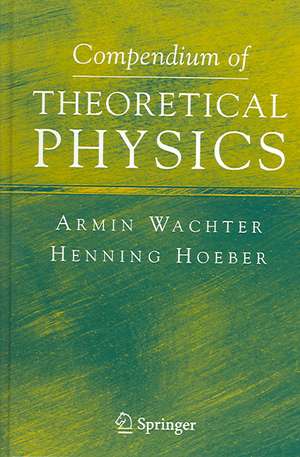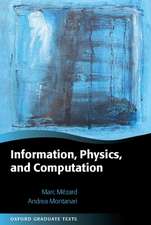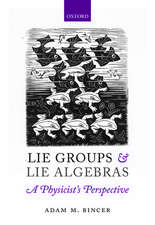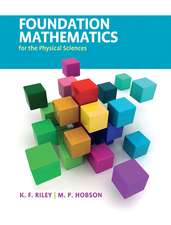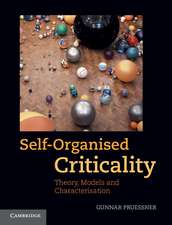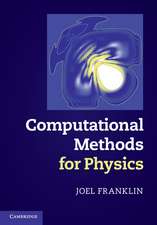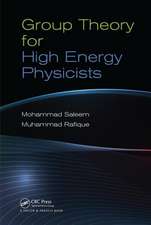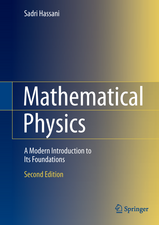Compendium of Theoretical Physics
Autor Armin Wachter, Henning Hoeberen Limba Engleză Hardback – 8 dec 2005
The authors take an axiomatic-deductive approach to each topic, starting the discussion of each theory with its fundamental equations. By subsequently deriving the various physical relationships and laws in logical rather than chronological order, and by using a consistent presentation and notation throughout, they emphasize the connections between the individual theories. The reader’s understanding is then reinforced with exercises, solutions and topic summaries.
Unique Features:
- Every topic is reviewed axiomatically-deductively and then reinforced through exercises, solutions and summaries
- Each subchapter ends with a set of applications, making the Compendium an ideal review of theoretical physics for physicists working in industry or research
- A Mathematical Appendix covers vector operations, integral theorems, partial differential quotients, complete function systems, Fourier analysis, Bessel functions, spherical Bessel functions, Legendre functions, Legendre polynomials and spherical harmonics
Henning Hoeber received his Ph.D. in Physics from the University of Edinburgh, Scotland and has since held research positions at the John von Neumann Institute for Computing (NIC) / Research Centre of Jülich, Germany and the University of Wuppertal, Germany. His research interests include elementary particle physics, lattice gauge theory, and computational physics, and since 1998 he has done extensive work in the fields of seismic processing, time series analysis, statistical and transform methods for seismic signal processing, and elastic wave propagation.
Toate formatele și edițiile
| Toate formatele și edițiile | Preț | Express |
|---|---|---|
| Paperback (1) | 511.05 lei 6-8 săpt. | |
| Springer – 5 oct 2010 | 511.05 lei 6-8 săpt. | |
| Hardback (1) | 599.97 lei 6-8 săpt. | |
| Springer – 8 dec 2005 | 599.97 lei 6-8 săpt. |
Preț: 599.97 lei
Preț vechi: 705.85 lei
-15% Nou
Puncte Express: 900
Preț estimativ în valută:
114.80€ • 120.19$ • 94.99£
114.80€ • 120.19$ • 94.99£
Carte tipărită la comandă
Livrare economică 05-19 aprilie
Preluare comenzi: 021 569.72.76
Specificații
ISBN-13: 9780387257990
ISBN-10: 0387257993
Pagini: 516
Ilustrații: XVIII, 516 p. 80 illus.
Dimensiuni: 155 x 235 x 30 mm
Greutate: 0.86 kg
Ediția:2006
Editura: Springer
Colecția Springer
Locul publicării:New York, NY, United States
ISBN-10: 0387257993
Pagini: 516
Ilustrații: XVIII, 516 p. 80 illus.
Dimensiuni: 155 x 235 x 30 mm
Greutate: 0.86 kg
Ediția:2006
Editura: Springer
Colecția Springer
Locul publicării:New York, NY, United States
Public țintă
GraduateCuprins
From the Contents:
Mechanics: Newtonian Mechanics.- Lagrangian Mechanics.- Hamiltonian Mechanics.- Motion of Rigid Bodies.- Central Forces.- Relativistic Mechanics.- Electrodynamics: Formalism of Electrodynamics.- Solutions of Maxwell’s Equations in the Form of Potentials.- Lorentz Covariant Formulation of Electrodynamics.- Radiation Theory.- Time-Independent Electrodynamics.- Electrodynamics in Matter.- Electromagnetic Waves.- Lagrange Formalism in Electrodynamics.- Quantum Mechanics: Mathematical Foundations of Quantum Mechanics.- Formulation of Quantum Theory.- One-Dimensional Systems.- Quantum Mechanical Angular Momenta.- Schrödinger Equation in Three Dimensions.- Electromagnetic Interactions.- Perturbation Theory and Real Hydrogen Atom.- Atomic Transitions.- N-Particle Systems.- Scattering Theory.- Statistical Physics and Thermodynamics: Foundations of Statistical Physics.- Ensemble Theory I: Microcanonical Ensemble and Entropy.- Ensemble Theory II: Canonical and Grand Canonical Ensemble.- Entropy and Information Theory.- Thermodynamics.- Classical Maxwell-Boltzmann Statistics.- Quantum Statistics.
Mechanics: Newtonian Mechanics.- Lagrangian Mechanics.- Hamiltonian Mechanics.- Motion of Rigid Bodies.- Central Forces.- Relativistic Mechanics.- Electrodynamics: Formalism of Electrodynamics.- Solutions of Maxwell’s Equations in the Form of Potentials.- Lorentz Covariant Formulation of Electrodynamics.- Radiation Theory.- Time-Independent Electrodynamics.- Electrodynamics in Matter.- Electromagnetic Waves.- Lagrange Formalism in Electrodynamics.- Quantum Mechanics: Mathematical Foundations of Quantum Mechanics.- Formulation of Quantum Theory.- One-Dimensional Systems.- Quantum Mechanical Angular Momenta.- Schrödinger Equation in Three Dimensions.- Electromagnetic Interactions.- Perturbation Theory and Real Hydrogen Atom.- Atomic Transitions.- N-Particle Systems.- Scattering Theory.- Statistical Physics and Thermodynamics: Foundations of Statistical Physics.- Ensemble Theory I: Microcanonical Ensemble and Entropy.- Ensemble Theory II: Canonical and Grand Canonical Ensemble.- Entropy and Information Theory.- Thermodynamics.- Classical Maxwell-Boltzmann Statistics.- Quantum Statistics.
Notă biografică
Armin Wachter holds a Ph.D. in Physics from the John von Neumann Institute for Computing (NIC) / Research Centre of Jülich, Germany. His research interests include theoretical elementary particle physics, heavy quark physics, heavy meson spectroscopy, algorithms on parallel computers, and lattice gauge theory. He is presently writing a textbook on relativistic quantum mechanics for Springer.
Henning Hoeber received his Ph.D. in Physics from the University of Edinburgh, Scotland and has since held research positions at the John von Neumann Institute for Computing (NIC) / Research Centre of Jülich, Germany and the University of Wuppertal, Germany. His research interests include elementary particle physics, lattice gauge theory, and computational physics, and since 1998 he has done extensive work in the fields of seismic processing, time series analysis, statistical and transform methods for seismic signal processing, and elastic wave propagation.
Henning Hoeber received his Ph.D. in Physics from the University of Edinburgh, Scotland and has since held research positions at the John von Neumann Institute for Computing (NIC) / Research Centre of Jülich, Germany and the University of Wuppertal, Germany. His research interests include elementary particle physics, lattice gauge theory, and computational physics, and since 1998 he has done extensive work in the fields of seismic processing, time series analysis, statistical and transform methods for seismic signal processing, and elastic wave propagation.
Textul de pe ultima copertă
Mechanics, Electrodynamics, Quantum Mechanics, and Statistical Mechanics and Thermodynamics comprise the canonical undergraduate curriculum of theoretical physics. In Compendium of Theoretical Physics, Armin Wachter and Henning Hoeber offer a concise, rigorous and structured overview that will be invaluable for students preparing for their qualifying examinations, readers needing a supplement to standard textbooks, and research or industrial physicists seeking a bridge between extensive textbooks and formula books.
The authors take an axiomatic-deductive approach to each topic, starting the discussion of each theory with its fundamental equations. By subsequently deriving the various physical relationships and laws in logical rather than chronological order, and by using a consistent presentation and notation throughout, they emphasize the connections between the individual theories. The reader’s understanding is then reinforced with exercises, solutions and topic summaries.
Unique Features:
Henning Hoeber received his Ph.D. in Physics from the University of Edinburgh, Scotland and has since held research positions at the John von Neumann Institute for Computing (NIC) / Research Centre of Jülich, Germany and the University of Wuppertal, Germany. His research interests include elementary particle physics, lattice gauge theory, and computational physics, and since 1998 he has done extensive work in the fields of seismic processing, time series analysis, statistical and transform methods for seismic signal processing, and elastic wave propagation.
The authors take an axiomatic-deductive approach to each topic, starting the discussion of each theory with its fundamental equations. By subsequently deriving the various physical relationships and laws in logical rather than chronological order, and by using a consistent presentation and notation throughout, they emphasize the connections between the individual theories. The reader’s understanding is then reinforced with exercises, solutions and topic summaries.
Unique Features:
- Every topic is reviewed axiomatically-deductively and then reinforced through exercises, solutions and summaries
- Each subchapter ends with a set of applications, making the Compendium an ideal review of theoretical physics for physicists working in industry or research
- A Mathematical Appendix covers vector operations, integral theorems, partial differential quotients, complete function systems, Fourier analysis, Bessel functions, spherical Bessel functions, Legendre functions, Legendre polynomials and spherical harmonics
Henning Hoeber received his Ph.D. in Physics from the University of Edinburgh, Scotland and has since held research positions at the John von Neumann Institute for Computing (NIC) / Research Centre of Jülich, Germany and the University of Wuppertal, Germany. His research interests include elementary particle physics, lattice gauge theory, and computational physics, and since 1998 he has done extensive work in the fields of seismic processing, time series analysis, statistical and transform methods for seismic signal processing, and elastic wave propagation.
Caracteristici
Offers a unified overview of theoretical physics, including Mechanics; Electrodynamics; Quantum Mechanics; and Statistical Mechanics and Thermodynamics Covers numerous applications in each section: rocket problem, Compton effect; Magnetic monopoles, properties of projection operators; Scattering on a hard sphere, classical phase space of the harmonic oscillator Exercises, solutions and short summaries confirm the reader’s understandind Useful for students preparing for degree exams
